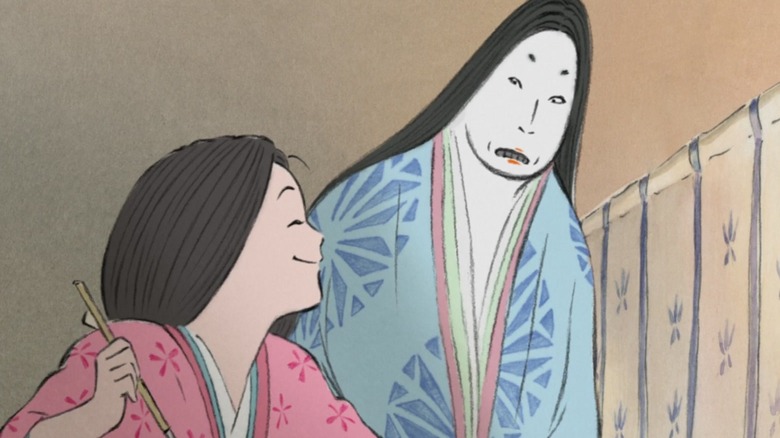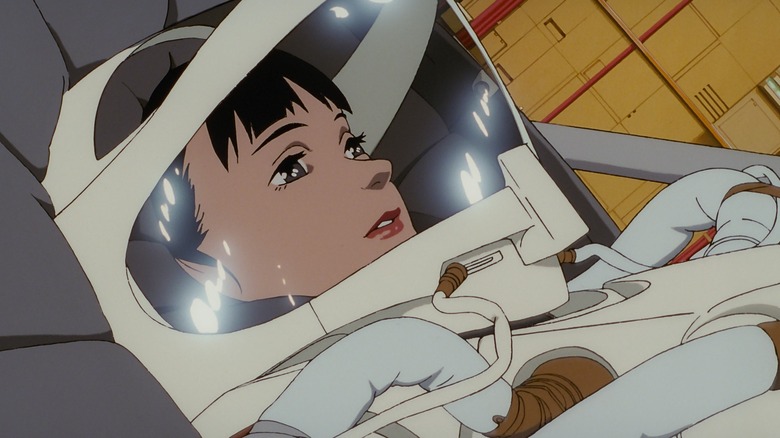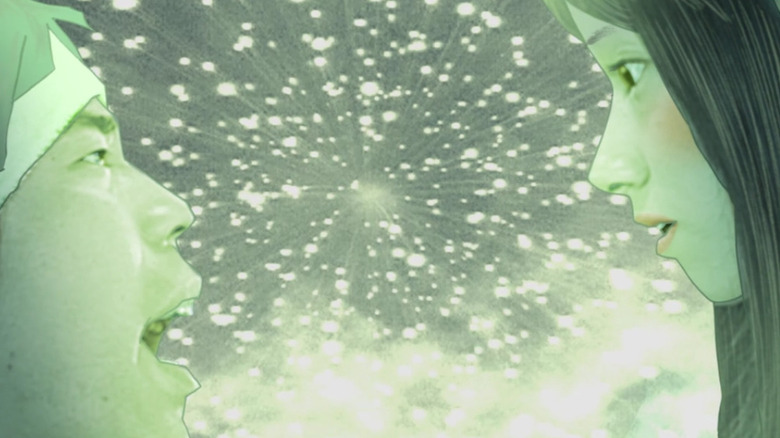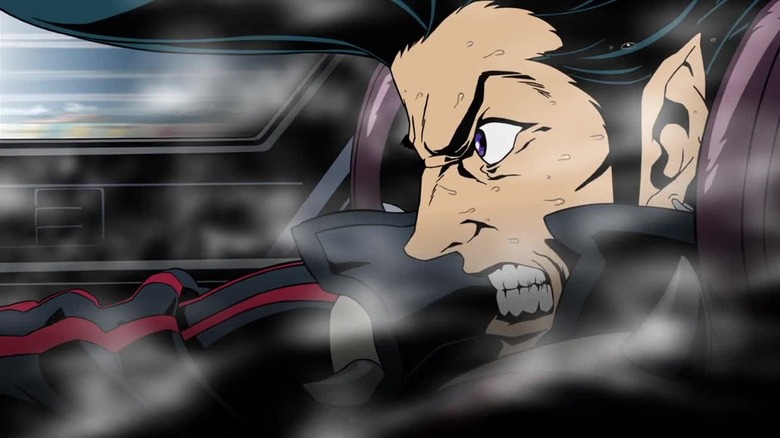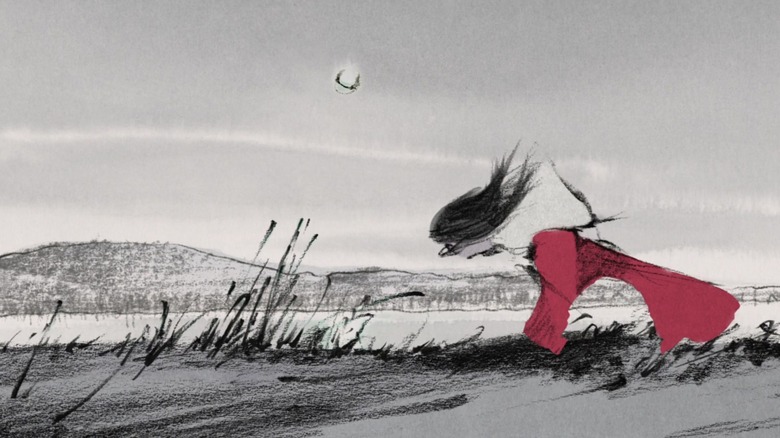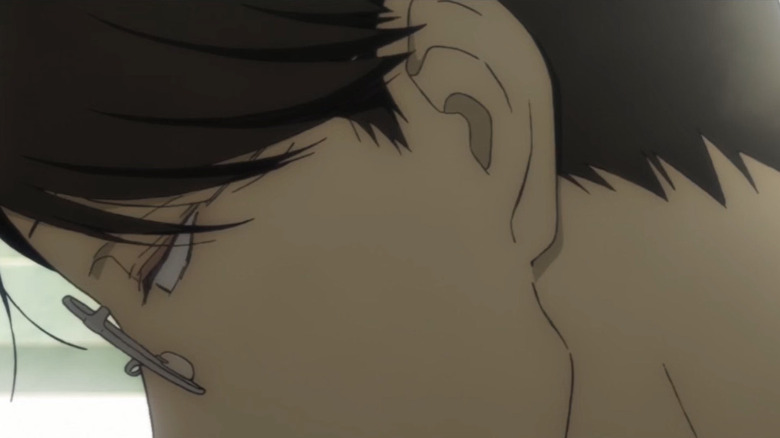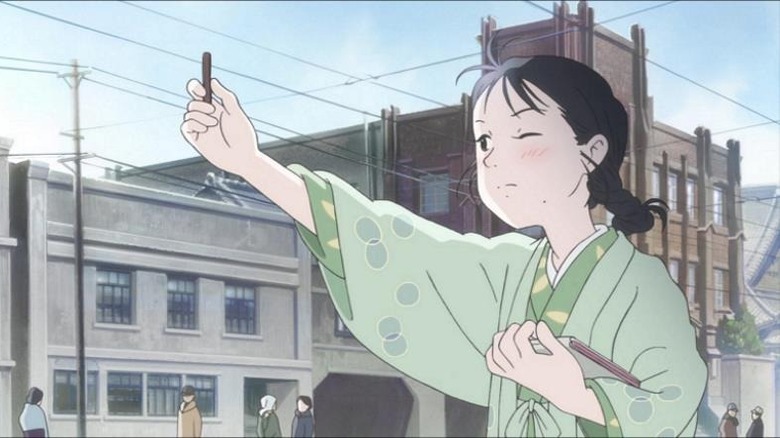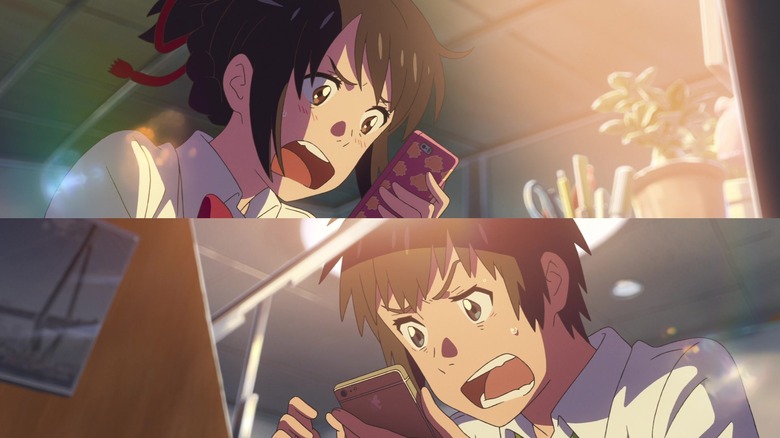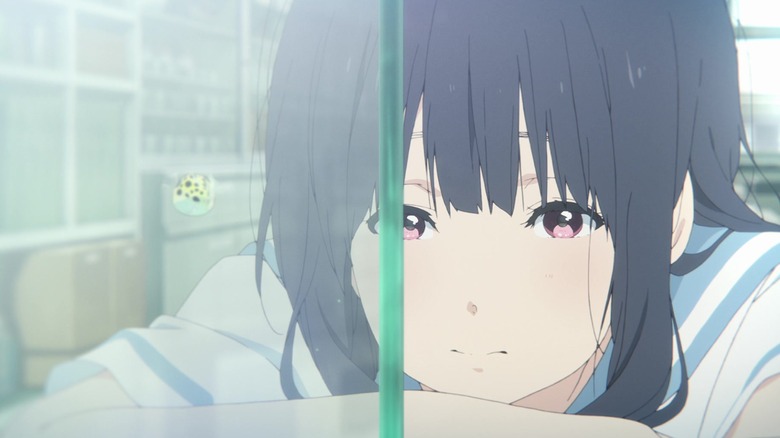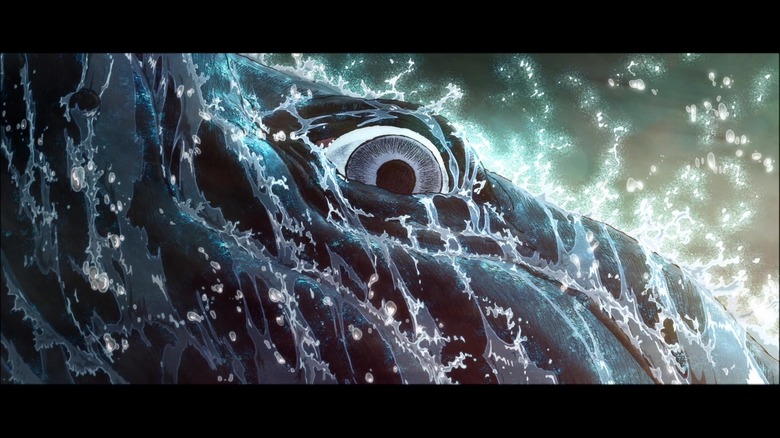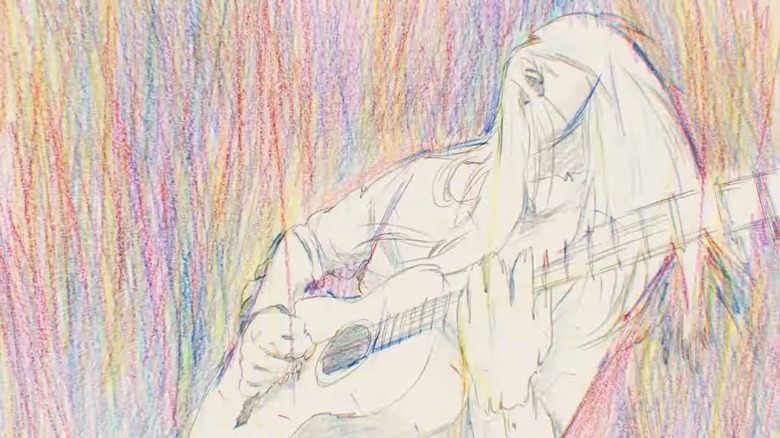10 Anime Movies That Deserved To Win The Oscar For Best Animated Feature
It's been an open secret for years that the Best Animated Feature Oscar is less about quality and more about which films voters bothered to see with their children that month. That isn't to say that the winners haven't been deserving. The nominees have still been packed with great work, courtesy of the lobbying efforts of distributors like GKIDS. Yet despite the variety of films nominated each year, Disney and Pixar have dominated the category while equally deserving films from around the world have been left in the cold. The anime industry in particular has only ever seen a single win in the history of the awards for Studio Ghibli's "Spirited Away," despite being a hotbed of animation talent. So let's dig into a collection of animated films produced in Japan that deserved to win an Oscar.
Since the Best Animated Feature Oscar did not exist until 2001, we're not including any films produced before that year. With one exception, we also avoided franchise films, so folks hoping for a list of just "Crayon Shin-chan" movies may want to look elsewhere. In this list, we chose to highlight both past award nominees as well as films that were not nominated, rather than limiting the list to the former.
While this list will focus exclusively on Japanese animated films, we'd also like to note that there's plenty of excellent work from other countries that are worth seeing as well! You can do worse than to immediately seek out "The Boy and the World", "The Girl Without Hands” and "Wolfwalkers." But for now, here's out list of the anime movies that should have won Best Animated Feature at the Oscars.
Millennium Actress
Satoshi Kon is one of the greatest anime directors of all time. He directed only a handful of films before his death in 2010, but I treasure every one of them. You know directors in Hollywood do as well, because folks like Darren Aronofsky and Christopher Nolan have been mining his back catalog for their own critically acclaimed films for the past several years. You can make a strong argument for any one of Kon's films as Oscar-worthy, but this shout out goes to "Millenium Actress".
The story of an old woman's life told through her career in the film industry occupies the middle ground between Kon's once-in-a-generation talent as a stylist and his willingness to get down in the dirt and tell stories about real, flesh-and-blood people. "Millennium Actress" is a story about rebirth through storytelling, a mystery box whose resolution is simply, "You live and you die." You can devote hours upon hours to "solving" the film's carefully interwoven motifs, if you care to, but the emotional climax brings the house down regardless.
Mind Game
Masaaki Yuasa is also one of the greatest anime directors of all time. After directing the popular "Devilman Crybaby" for Netflix, he's since become a critic's favorite for visually eccentric films like "Night is Short, Walk On Girl". Personally, I can't wait to see "Inu-Oh", his final film (for now) and collaboration with fantastic Japanese comics artist Taiyou Matsumoto.
But before his mainstream success, even before directing fantastic TV series like "Kaiba" and "The Tatami Galaxy", there was "Mind Game:" An animated movie where god is a fish, man plays limbo with his unmentionables, and the meaning of life is a desperate run towards the surface that breaks all the rules of physics and casualty. It's a cacophony of animation styles and influences, mixing beauty and ugliness indiscriminately. But Yuasa's always been a big sap, and the excesses of "Mind Game" are tempered by an earnest love powerful enough to melt the heart of any skeptic. I'm not sure when "Mind Game" would have been "eligible" for the Oscars, since it wasn't shown in United States theaters until years after its release, but it's certainly good enough for consideration.
Redline
"Redline" is a movie where cars go fast. In a galaxy consumed by criminal syndicates and capitalist excess, a race fixer named Sweet JP unexpectedly wins a ticket to the biggest race there is. But the race is on the dangerous planet Roboworld, where there's also a cute girl named Sonoshee. What's a guy like JP to do?
"Redline" is a passion project that took seven years to make. Director Takeshi Koike holed up with his friends at Madhouse and put their heads together to create the most outrageous, exhilarating film they could. The result is a singular work of science fiction that creates a fantastic world out of whole cloth, simply so that cool characters can drive their cars through it at a thousand miles per hour. The film's greatest ambition is to fully depict the sensation by which extreme speed stretches JP's hairdo like extra-dimensional taffy, and no other movie can equal its capacity to do so.
The Tale of Princess Kaguya
As the only anime director ever to win an Oscar, Studio Ghibli director Hayao Miyazaki needs no introduction. But his colleague Isao Takahata is a director of equal (and to some, even greater) reputation. His work spans from nuanced slice of life ("Only Yesterday") to wrenching drama ("Grave of the Fireflies") to supernatural comedy ("Pom Poko"). His final film, "The Tale of Princess Kaguya", adapts a Japanese folk tale into a sprawling domestic epic sketched in brushstroke via groundbreaking technology. It's one of the most visually gorgeous films ever made, its best sequences eliciting the kind of awe you feel deep in your gut when volcanoes erupt. The film is overlong, but the ending will make you weep. More than any other film on this list, the fact that "The Tale of Princess Kaguya" did not win the Oscar the year it was nominated is a crime.
Doukyuusei
"Boy's love" (or Yaoi) comics have a strong following in Japan, but we've only begun to see animated film adaptations of these stories over the past few years. Director Shouko Nakamura, star animator and character designer Akemi Hayashi, and art director Chieko Nakamura joined forces after working together on the wonderful and ambitious TV anime psychodrama "Penguindrum." This time, they adapted "Doukyuusei" (or "Classmates"), a simple tale of two high school boys who meet and fall in love drawn by fantastic manga artist Asumiko Nakamura.
Shouko Nakamura's careful direction captures the comic's tempo, while the teenage characters come to lanky, appealing life under Hayashi's pen. It's a slight film at just an hour, content to be nothing more ambitious than a sweet story of adolescent romance. But it's an easy film to like and a cult classic among anime fans in the know. Nakamura's career has been quiet since, save for design consultation, storyboarding individual episodes and ending credit sequences, and serving as animation director for "Looking for Magical Doremi." But her work has been excellent, and I hope to see at least one other film from her one day.
In This Corner of the World
Adapted from a series by award-winning comics artist Fumiyo Kouno, "In This Corner of the World" tells the story of a young woman engaged to marry a man living in the seaside town of Eba, just a few miles from Hiroshima, in the final years of World War II. Director Sunao Katabuchi and his crew spent years researching the time period and taking extensive photography, so as to recreate the setting as faithfully as possible. The result is a delicate story of daily life and perseverance told with immaculate detail, whose slide into suspense and terror is so gradual the viewer may not realize they're deep in the trenches of hell until it's too late. It's studio MAPPA's greatest accomplishment and arguably the last great film they made before they sold out.
Your Name
It's become a sport in some circles to bash "Your Name", one of the most successful animated films ever made. After all, its story is fairly similar to 2006's romantic drama "The Lake House" starring Keanu Reeves and Sandra Bullock. Isn't that silly? Personally, I like "Your Name" a lot. To begin with, it's the first of director Makoto Shinkai's films to crack a joke now and then. But on top of that, "Your Name" — a body-swapping romantic comedy that reveals itself over time to be far grander than you initially thought — does such a great job of capturing the experience of online friendships.
Mitsuha lives in the country and Taki lives in the city. By switching bodies they become intimately familiar with the surface detritus of each other's lives. But they soon come to grapple with just how much space (and time) separates them. How much are you willing to give for someone you might never meet? "Your Name" isn't the only film to ask this question, and it isn't even the best anime film of its year. But it blew up for a reason, and the Oscars should at least be capable of recognizing that.
Liz and the Blue Bird
On the surface, "Liz and the Blue Bird" looks like the kind of warm, immaculate slice-of-life drama you'd expect from fan-favorite studio Kyoto Animation. Look closer, and you realize that "Liz and the Blue Bird" is an art film: a claustrophobic fable of shadow and light that traps two teenage girlfriends inside a school building and then surgically explores the deep contradictions within their relationship.
Director Naoko Yamada famously composed the soundtrack with the composer Kensuke Ushio by utilizing math equations and the sound of classroom objects. It's heady stuff for a spin-off of a popular TV series, but maybe it says something about Kyoto Animation that they allowed their star director at the time to transmute one of their properties into something this distinctive and challenging.
My one reservation in picking this film is that its competition is "Spider-Man: Into the Spider-Verse", one of the best superhero films of all time and a genuine sea-change in 3D animation techniques. "Liz and the Blue Bird" might be a harder sell to general audiences, but it is, in its own quiet way, a film of equal fearlessness.
Children of the Sea
One of the great challenges of adapting a comic is adapting its essence to motion without sacrificing the powerful appeal of the still image. "Children of the Sea" faced a seemingly impossible task in animating the art of Daisuke Igarashi, whose work captures the beauty and danger of nature as effectively as any comics artist who has ever lived. The finished film struggles to trim the comic's psychedelic detours into a coherent narrative. But in its best moments, "Children of the Sea" perfectly captures the transcendence of Igarashi's work: the process by which life is born and is consumed, the process by which its young heroine transforms over the course of one summer. There are images here (falling rain like fish, a great underwater shark, an explosive climax where all life in the sea is reborn) that stand alone as some of the most shockingly gorgeous sequences I've seen in my life. If you're a fellow lover of the ocean with the patience needed to see this movie through, I recommend tracking it down. Too bad its reputation will forever be stained by Studio 4C's terrible practices.
On-Gaku: Our Sound
"On-Gaku" is a laid-back story about three high school delinquents who decide to start a band. Their peers are so impressed with their music that they invite them to a rock festival, leading to an explosive musical climax that may be one of the most memorable in anime history. Adapted from an independent comic by a first-time director and his team over the course of seven years, the film cuts away from popular trends and instead embraces the mundane. The character designs are simple and unattractive, the environments worn down. Scenes pass as the cast simply stare at each other, trying to find words. But the film is excellent at capturing both the banality of teenage life and the raw sensation of music via animation. In the film's climax, when our heroes perform and the words they've been struggling to express finally erupt, its sweetness and sincerity is enough to make anyone believe in the power of rock.
